Iranians vote out of duty, hope and obligation
Ahmadinejad is constitutionally barred from standing for a third consecutive term.
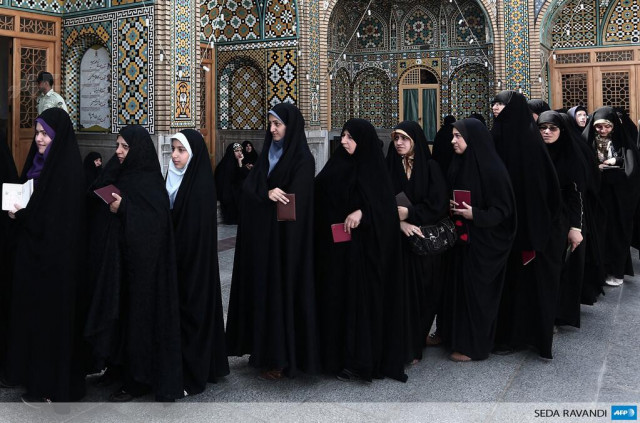
Iranian women wait to vote at a polling station at the Massoumeh shrine in the holy city of Qom. PHOTO: AFP
Mehrdad, a 22-year-old university student voting in his first presidential election, said he had rushed to his designated polling station at a mosque in western Tehran.
Some 70 people had already formed separate queues of men and women before polling opened officially at 8:00 am (0330 GMT).
"I'm voting because I want to be a part of building my country's future," said Mehrdad, adding that his choice was Tehran Mayor Mohammad Baqer Qalibaf.
"I want a president who understands the pain of the middle class," he said, arguing that conservative frontrunner Qalibaf was popular because of his track record as mayor.
Like the other five candidates, Qalibaf has pledged to fix an economy hurt by international sanctions and charges of mismanagement after eight years under Ahmadinejad.
Iran has been at loggerheads with world powers over its nuclear ambitions, which the West suspects is aimed at developing atomic weapons.
The stand-off has resulted in the imposition of harsh economic sanctions and Tehran's international isolation.
Another main contender is top nuclear negotiator Saeed Jalili, whose five years of negotiations with world powers over Iran's atomic drive have failed to yield a breakthrough.
"I voted for Jalili... his comments and actions are in accordance with supreme leader Ayatollah Ali Khamenei's guidelines," said a cleric, after voting in a south Tehran mosque.
Others, disillusioned by the situation the country finds itself in, said they were voting out of a sense of national duty and as a way of confronting Iran's enemies.
Standing in a long queue at a school in the upscale Shahrak Gharb area of west Tehran, a 74-year-old retired government employee said he would vote despite being "dissatisfied with the establishment".
"I believe we all have to vote to demonstrate to the world that we are united," he said. "This will force our enemies into retreat."
All political factions have called for a high turnout in Iran's first presidential poll since the disputed re-election of Ahmadinejad in 2009 sparked massive street protests that led to a deadly crackdown.
Ahmadinejad, who is constitutionally barred from standing for a third consecutive term, has been accused of mismanaging Iran's oil wealth and widening the economic gap between social classes.
A 50-year-old worker said that she too was voting for Qalibaf because she wanted improvements on the labour market.
"I want a president who makes things better for workers," said the woman who asked that her name not be used. "I hope all his promises come true."
Six presidential hopefuls are standing: five from a currently divided conservative camp against one moderate, Hassan Rowhani who has won the backing of marginalised reformists including ex-president Mohammad Khatami.
At a polling station in an affluent neighbourhood in the north of the capital, Elias, 48, waited among some 200 voters.
He said his choice was Rowhani, "the most suitable candidate to run the country".
Many people refused to divulge their choice. But some admitted they felt an obligation to vote if they wanted to hold on to government jobs.
"I'm a teacher in a public school. I did not want to vote but I have to or I won't be offered a new contract next year," said 32-year-old Nicky.
State television broadcast footage of long queues at polling stations across the country where more than 50 million people are eligible to vote.
Voters split but turnout high in Iran election
Iranian voters appeared to turn out in large numbers on Friday to choose a new president despite a limited choice of one relative moderate and five hardline conservatives, with long queues forming outside polling stations.
Supreme Leader Ayatollah Ali Khamenei urged Iranians to participate in force in the vote, damning US officials who criticised the fairness of the election.
Reuters journalists were not granted visas to cover the vote but witnesses who visited several polling stations in the capital Tehran early in the day said there were more people waiting to vote than at the previous election in 2009.
Interior Minister Mostafa Mohammad Najjar told state Press TV there had been a large turnout across the country in response to the leader's call.
"They want to stand against the enemy," he said. Israel, the United States and their allies, who accuse Tehran of seeking to develop nuclear weapons, top Iran's list of foes.
The interior ministry extended voting time by several hours, Press TV said, due to the large number of voters waiting outside polling stations.
Iranian analysts said a big turnout could benefit the sole moderate conservative candidate Hassan Rohani, since some of his natural supporters in the urban middle class had been toying with abstention.
Rohani's call to rehabilitate Iran's foreign relations and enact a "civil rights charter" has resounded with many Iranians eager for change.
But some reformists said they were still doubtful about voting after the experience of 2009 when reformist leaders said the election was stolen from them to return President Mahmoud Ahmadinejad to office.
The government denied rigging the count.
"I am standing in line right now to vote. Making up my mind
about voting or staying away was a struggle for me," said
Shaqayeq, a student in Tehran.
"Most reformists have urged us to vote and therefore I decided to vote too. For Rohani."
Mahnaz, a Tehran artist, was still agonizing. "I am still not sure if I want to vote or not. I still remember what happened four years ago and that angers me," she said.
"But a part of me still believes voting is important ... If I decide to vote I will vote for Rohani because he is the only moderate among the candidates."


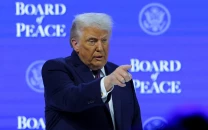
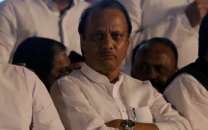
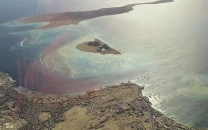
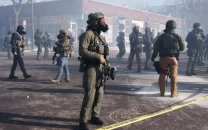
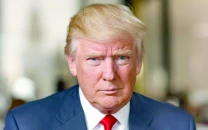












COMMENTS
Comments are moderated and generally will be posted if they are on-topic and not abusive.
For more information, please see our Comments FAQ